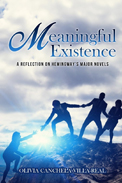
 |
Too often, facing mortality is the only catalyst to provoke life’s most intimate and existential questions. In Villa-Real’s study of Hemingway, she weaves the prolific author's life and her Christian upbringing into the narrative to deliver a deeply probing analysis while simultaneously allowing audiences into the mind and experiences of a man who shaped a work that has influenced millions throughout communities and classrooms alike.
From a metaphysical perspective, Villa-Real explores the notion of the purpose of man, who is created from the image of an infinitely good God yet is so imperfect himself. Using The Sun Also Rises, A Farewell to Arms, For Whom the Bell Tolls, and The Old Man and the Sea, the author dives into the deep end of morality and human nature, contemplating the dichotomy between pleasure and suffering and how even in suffering, there is a silver lining that paves the pathway to eventually experiencing lasting joy. In this work, the author transports readers to Hemingway’s humble beginnings in Oak Park, Illinois, where his first forays with the word came as the editor of the school paper, Trapeze. Then, Hemingway’s endeavors take him from boxing against stiff competition to conquer danger to finding himself at the Italian front as an ambulance driver for the Red Cross, an undoubtedly visceral experience that seeps into his literary works.
Interestingly, the worlds Hemingway has constructed are predicated on an inability to avoid incessant suffering, though there is a clear progression from an individualistic, self-centered protagonist to one more intuitive and wholesome, concerned about the greater good. Ultimately, Villa-Real’s work is thorough in dissecting Hemingway’s life as well as the kaleidoscope of his characters, all from the lens of the end goal: living a life of pure love as depicted in Christianity.